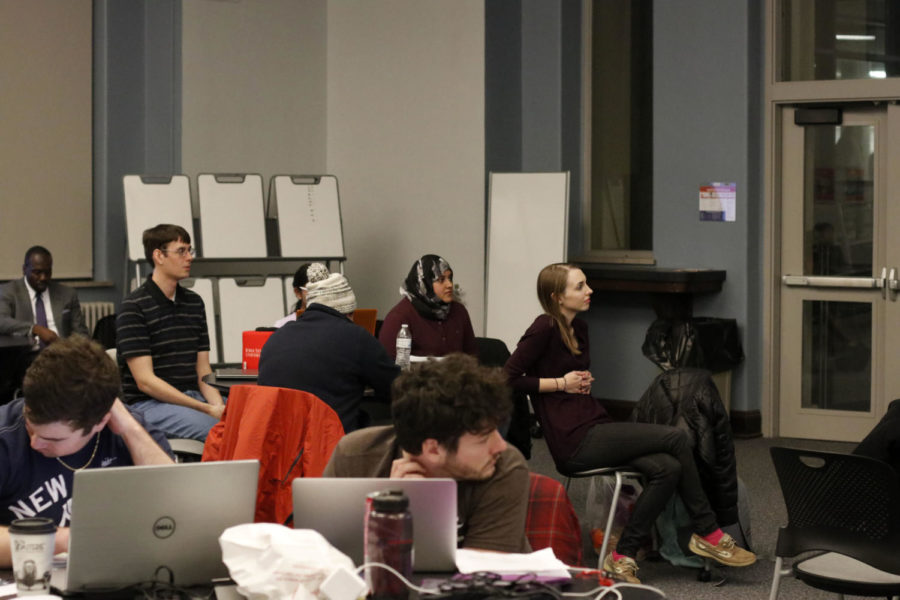GPSS elects new Professional Advancement Grant chair
Gillian Holte/Iowa State Daily
The Graduate and Professional Student Senate held a town hall and listening session with Iowa State President Wendy Wintersteen on Nov. 14 in Room 198 in Parks Library.
September 30, 2019
The Graduate and Professional Student Senate (GPSS) elected a new Professional Advancement Grant (PAG) chair and began efforts to create a new constitution at Monday’s meeting.
Qi Mu, the previous GPSS PAG chair, resigned Wednesday.
Mu joined GPSS as a senator and member of the PAG committee in 2018 and had been serving as the PAG chair since April 29.
The PAG chair receives a $1,100 stipend at the beginning of their term, and Mu served five months of her eight-month term.
Since Mu served five of her eight months, GPSS passed a resolution to have Mu pay $412.5 back to GPSS as a stipend for the next PAG chair’s stipend. $412.5 is three-eighths of the $1,100 stipend originally paid to Mu presuming she would serve the entire term. Mu will keep $687.5, the five-eighths of the original stipend, for her service.
GPSS started by holding a special election to appoint a new PAG chair.
The PAG chair is in charge of reviewing professional advancement grants according to GPSS-approved PAG policy, allocating appropriate funds to PAG grant recipients on a monthly basis and reviewing nominations for various awards.
The PAG Committee is in charge of evaluating five awards: the Margaret Ellen White Award, GPSS Teaching Award, GPSS Research Award, GPSS Leadership Award and Wakonse Fellowship award.
Senators were permitted to nominate themselves without a secondary motion from another senator or accept nominations from other senators. After discussion, four senators were nominated for the PAG chair position: Johnathon Shook, Gitesh Patil, Benjamin Robertson and Joey Saavedra.
A first vote was held where Senator Shook received 26 votes, Senator Patil received seven votes, Senator Robertson received seven votes and Senator Saavedra received 23 votes.
After not having a simple majority of votes for any candidate, the Senate decided to open the floor to questions directed to each candidate.
The candidates answered questions on prior GPSS committee membership, the role of the PAG chair, previous experience reviewing topics without bias and primary reasons they wanted to be the PAG chair.
After the question and answer period, a secondary vote was held where Senator Shook received 35 votes, Senator Patil received four votes, Senator Robertson received 16 votes and Senator Saavedra received 16 votes; ultimately, Senator Shook was elected as the PAG chair.
GPSS then passed a vote to create a committee to review the GPSS Constitution and bylaws and draft new ones.
The Special Committee for Constitutional Revision will report back to the Senate with a progress report on Oct. 28 and have a draft on Dec. 3. The new constitution will require ratification by GPSS with a three-fourths majority of a senate quorum.
For more information on GPSS and its senators go to www.gpss.iastate.edu. The next GPSS meeting is at 6:30 p.m. Oct. 28 in the Campanile Room of the Memorial Union.

















